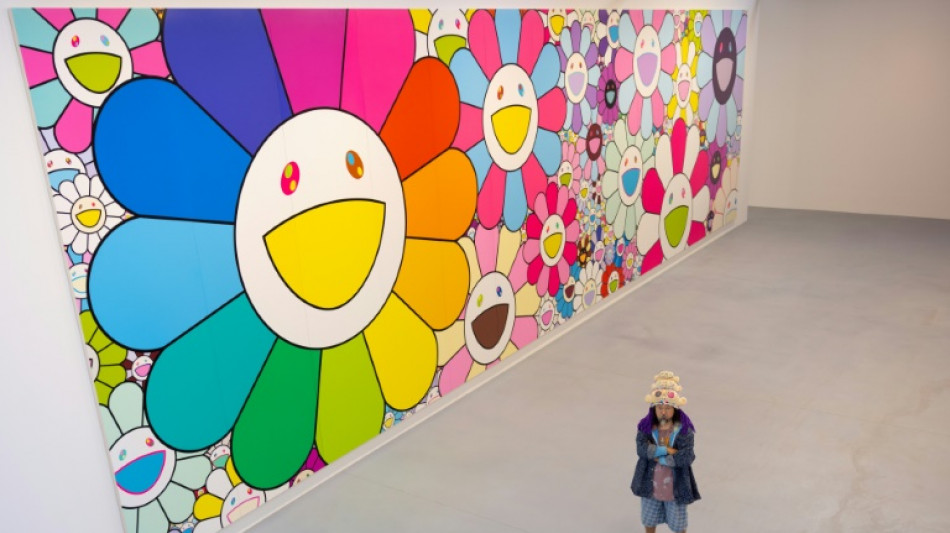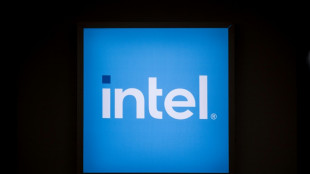
-
 Indian army says new exchange of gunfire with Pakistan
Indian army says new exchange of gunfire with Pakistan
-
Epstein accuser Virginia Giuffre takes own life in Australia: family

-
 Hundreds of buildings damaged, dozens injured in 6.3 Ecuador quake
Hundreds of buildings damaged, dozens injured in 6.3 Ecuador quake
-
India and Pakistan's Kashmir fallout hits economy too

-
 Francis's funeral to be grand farewell to 'pope of the poor'
Francis's funeral to be grand farewell to 'pope of the poor'
-
Pogacar faces defiant Evenepoel at Liege-Bastogne-Liege

-
 Chelsea eye great escape against Barcelona in Women's Champions League
Chelsea eye great escape against Barcelona in Women's Champions League
-
Iran, US to hold new round of high-level nuclear talks

-
 'Energy and effort' pay off for Reds as Blues' woes continue
'Energy and effort' pay off for Reds as Blues' woes continue
-
Albatross and closing birdie lift China's Liu to LPGA Chevron lead

-
 On the horizon? Wave of momentum for high seas treaty
On the horizon? Wave of momentum for high seas treaty
-
Developing countries should fast-track US trade deals: World Bank president

-
 Grizzlies' Morant 'doubtful' for must-win game 4 v Thunder
Grizzlies' Morant 'doubtful' for must-win game 4 v Thunder
-
Trump in Rome for pope funeral in first foreign trip of new term

-
 Trump says Russia-Ukraine deal 'very close' after new Kremlin talks
Trump says Russia-Ukraine deal 'very close' after new Kremlin talks
-
US rookies lead PGA pairs event with McIlroy and Lowry in hunt

-
 Trump tariff promises get a reality check
Trump tariff promises get a reality check
-
Warriors coach Kerr 'relatively optimistic' injured Butler will play game 3

-
 Postecoglou hopes 'Stonecutter's Credo' can inspire Spurs
Postecoglou hopes 'Stonecutter's Credo' can inspire Spurs
-
PSG lose unbeaten Ligue 1 record ahead of Arsenal showdown

-
 Venezuela accuses El Salvador president of 'human trafficking'
Venezuela accuses El Salvador president of 'human trafficking'
-
Own goal takes Sundowns to African final against Pyramids

-
 Scores of buildings damaged, 20 injured in Ecuador quake
Scores of buildings damaged, 20 injured in Ecuador quake
-
US stocks extend rally as market eyes busy calendar next week

-
 Pope's death triggers surge of disinformation he fought against
Pope's death triggers surge of disinformation he fought against
-
Rovanpera takes control of Rally Islas Canarias

-
 Zelensky insists Crimea is Ukrainian as US envoy meets Putin
Zelensky insists Crimea is Ukrainian as US envoy meets Putin
-
Patel and Mendis help Sunrisers beat Kings in Dhoni's 400th T20

-
 Copa del Rey ref statements 'unacceptable': Real Madrid after boycotting final build-up
Copa del Rey ref statements 'unacceptable': Real Madrid after boycotting final build-up
-
Insurance CEO's accused killer pleads not guilty to federal murder charges

-
 FBI arrests Wisconsin judge for shielding undocumented migrant
FBI arrests Wisconsin judge for shielding undocumented migrant
-
Brazil ex-president Collor de Mello jailed for corruption

-
 Zelensky insists Crimea 'belongs' to Ukraine as US envoy meets Putin
Zelensky insists Crimea 'belongs' to Ukraine as US envoy meets Putin
-
Real Madrid boycott Copa del Rey build-up over referee complaints

-
 Trinidad and Tobago votes for parliament, PM, with opposition in lead
Trinidad and Tobago votes for parliament, PM, with opposition in lead
-
IMF chief hails 'constructive' Spring Meetings held under tariff uncertainty

-
 Iran FM Araghchi in Oman ahead of nuclear talks with US
Iran FM Araghchi in Oman ahead of nuclear talks with US
-
Dozens of buildings destroyed, 20 injured in Ecuador quake

-
 Young Barca must 'enjoy' Real Madrid Copa final fight: Flick
Young Barca must 'enjoy' Real Madrid Copa final fight: Flick
-
Pakistan and India border closure separates families

-
 Brazil's Bolsonaro 'stable' after post-surgery setback
Brazil's Bolsonaro 'stable' after post-surgery setback
-
Catholics in secular Cuba hail Francis as 'bridge'

-
 US envoy Witkoff, Putin discuss 'possibility' of direct Russia-Ukraine talks
US envoy Witkoff, Putin discuss 'possibility' of direct Russia-Ukraine talks
-
Community seeks answers after French school knife killing

-
 German prosecutors seek jail terms in VW 'dieselgate' trial
German prosecutors seek jail terms in VW 'dieselgate' trial
-
Sabalenka makes winning start at Madrid Open

-
 EU, US should de-escalate and negotiate trade deal: IMF Europe director
EU, US should de-escalate and negotiate trade deal: IMF Europe director
-
Russia accuses Ukraine of killing general in car bombing

-
 Emery wants FA Cup glory and Champions League berth for Villa
Emery wants FA Cup glory and Champions League berth for Villa
-
Buildings destroyed, one injured in Ecuador quake


Takashi Murakami loves and fears AI
Neo-pop art superstar Takashi Murakami has always embraced new technology and was an early adopter of crypto and NFTs, but even he admits fearing that AI might make him obsolete.
Murakami, 61, has become a brand unto himself thanks to his loveable technicolour paintings that mix traditional Japanese art motifs with modern anime and manga.
His paintings have sold for millions of dollars, led to fashion collaborations with Louis Vuitton and Kanye West, and been shown at some of the world's great institutions, prized as insightful commentary on the fine line between art and commerce.
It has not always made him popular with Japan's art establishment, but Murakami likes being a disruptor.
He sees another wave of change coming thanks to AI-powered software.
"The generational change will be dramatic," he told AFP at the opening of a new exhibition at the Gagosian gallery on the outskirts of Paris.
It reminds him of the arrival of the Apple II computer in the 1980s that swept away an older generation of design professionals, but empowered those who embraced it.
"AI will certainly do damage to technical trades but I don't think it will be able to block our ideas," he said.
"The wackiest ideas, those that even AI cannot generate, will become even more valuable."
That does mean power perhaps shifting from artists to tech engineers, who will be able to explore things that are hard to imagine at the moment.
"Artists who create familiar things will be left behind," he said.
"I myself work with a certain kind of fear of one day being replaced."
- 'Not very appreciated' -
Ironically, Murakami says he was touched to finally receive some praise from a more traditional part of Japanese society with his recent work in homage to Kabuki theatre.
He spoke to AFP in front of an enormous 23-metres-long by 5-metres-high fresco that tells a Kabuki narrative in his dazzling, cartoonish style.
"I'm not very appreciated in Japan," he said, wearing Bermuda shorts and a jacket adorned with his famous smiling flowers.
"My reputation is fairly bad because I'm seen as presenting a false image of Japanese culture to the rest of the world.
"This is the first time I was welcomed in this way in Japan. I was very pleased."
- 'A new continent' -
Nonetheless, his commitment to technological change is clear.
Visitors to Saturday's gallery opening -- requiring some dedication since it was hidden away among the private jet hangars near Charles de Gaulle airport -- were set to receive an NFT of a flower-adorned virtual coin.
The show includes a wall of NFT-style pixelated portraits that draw a line from Karl Marx and Adam Smith to current tech honchos Vitalik Buterin and Elon Musk.
Like all his work, they are deceptively simple, seemingly printed, yet in fact painstakingly painted by hand and then lacquered to remove any sign of human involvement and create his renowned "Superflat" aesthetic.
He sees this work as building a bridge between traditional and digital art, but admits they can be a hard sell.
"Collectors who have been fans of mine for a long time clearly have some trouble with these pixelated drawings," he said.
"But I created my works following Japanese or Eastern styles, not Western, and I consider pixel art to be a sort of representation of Japanese culture from the video games of the 1970s."
The world of crypto is "like a new continent" still being discovered.
"It will take several more years for people to get used to it," he said.
O.Johnson--AMWN



